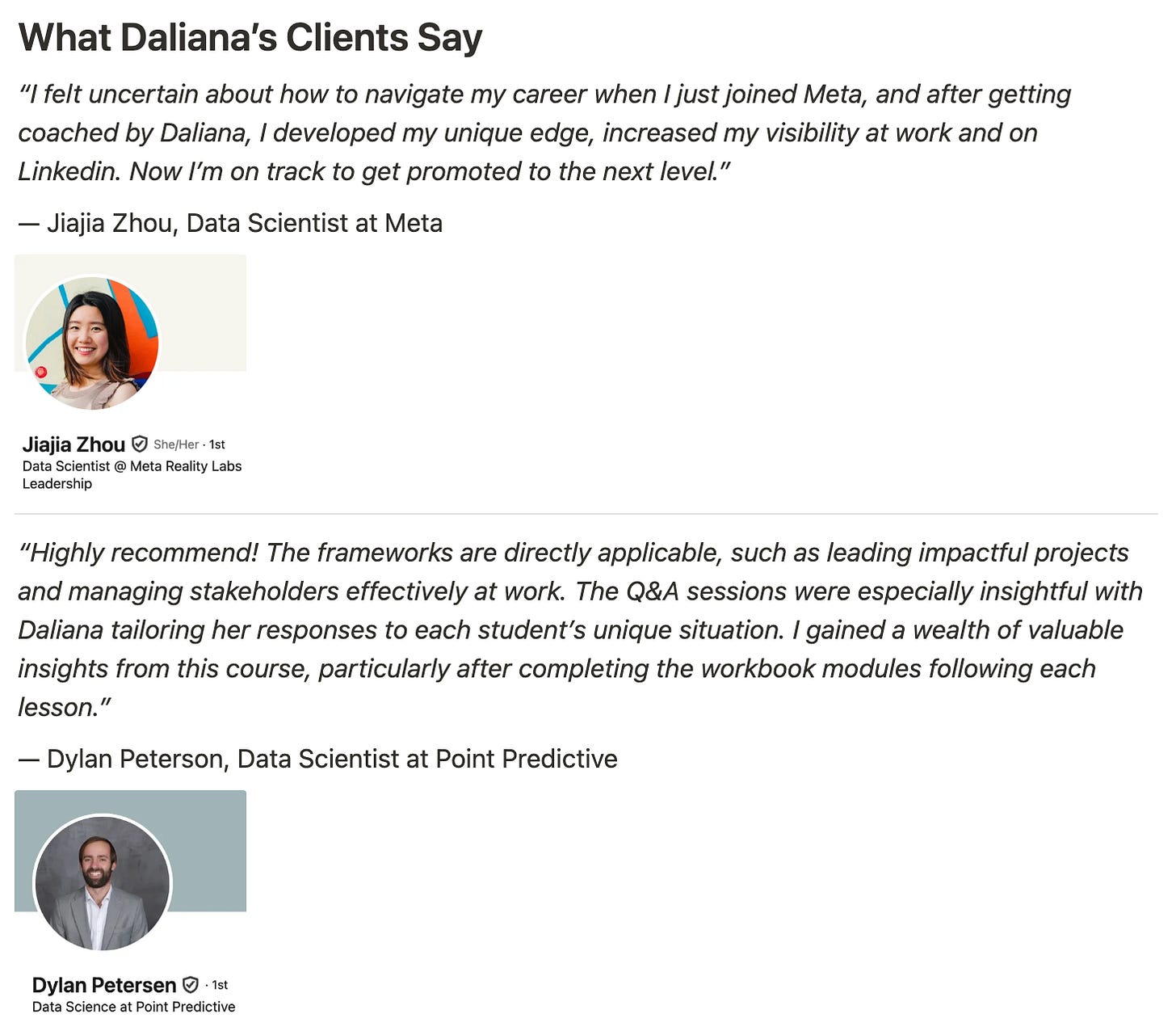The email that changed everything
How this data scientist finally got stakeholders to pay attention
Hello friends,
I recently coached a data scientist at Uber who improved her ML model's precision and recall by ~ 10%. Solid technical work, right?
But when she presented to business stakeholders, they barely reacted.
Business leaders care more about what this means for them:
What does this mean for churn rate?
How does this translate to revenue?
What's the actual business impact?
In my career accelerator program, I shared a template for translating technical improvements into business language. She used it in stakeholder presentations, and they were more engaged than before.
It works. However, this only solved 50% of her problem.
She told me, "I tried setting up meetings with stakeholders to get more alignment, but they are so busy. They skip my meetings. I'm having trouble getting their feedback. I feel invisible."
Then I shared this story with her:
At Amazon, I had a coworker who sent weekly product updates every Friday. Simple, consistent communication about progress, blockers, wins, and customer feedback.
In a team meeting, our director mentioned it was his "favorite email to read on Fridays."
Here's why this worked:
You might not always get 30 mins from your director’s calendar, but you can always send an update. No one likes to read another email, but this one is short and structured, saving the director’s time. His project received more visibility and support than teams relying solely on scheduled meetings.
My client took this idea and started sending weekly updates to her stakeholders. The results were immediate: stakeholders became more engaged, and she gained significantly more visibility with leadership.
She "trained" her stakeholders to expect regular updates, and they began to see her work as important and strategic rather than just another technical project.
When stakeholders have to chase you for updates, you've already lost trust.
But when you proactively communicate progress using language they understand, you position yourself as a “trusted advisor” who thinks strategically about business impact, not just technical execution.
Why this matters more than perfect code
Your productivity isn't just about technical execution. Maybe 50% of your time is coding, but the other 50% is getting buy-in, securing resources, and ensuring your work doesn't get derailed.
The most productive data scientists aren't the ones writing the most code. They're the ones who:
Give context regularly
Send mid-process updates
Show "ugly" work early to get feedback
Keep stakeholders informed about progress and blockers
That "invisible" work - communication, relationship-building, stakeholder management - often determines whether your technical work actually makes an impact.
You can write perfect code, but if you don't communicate progress effectively, your project can still get pushed aside.
The visibility advantage
The data scientists who advance fastest aren't necessarily the most technically skilled - they're the ones who translate technical excellence into business language and build relationships with key stakeholders.
Having great code won't be enough if people don't understand its value.
Ready to turn your technical expertise into the career visibility you deserve? I'm opening my Strategic Visibility program for 10 data scientists and AI/ML professionals who want to position themselves for senior roles, and become the go-to experts in their organization and in the industry.
Over 6 weeks, we'll build the exact communication and positioning skills that turn technical excellence into influence and authority.
If you qualify, I’ll schedule a 30-minute 1-on-1 consultation call with you to see if you are a good fit.
Your technical skills are brilliant. Now let's make sure people know it.
Daliana




Great point. When I first started out, I would use all kinds of technical jargon when talking to clients until someone told me that I need to speak to them in the language they understand. Best advice I have ever gotten starting out.